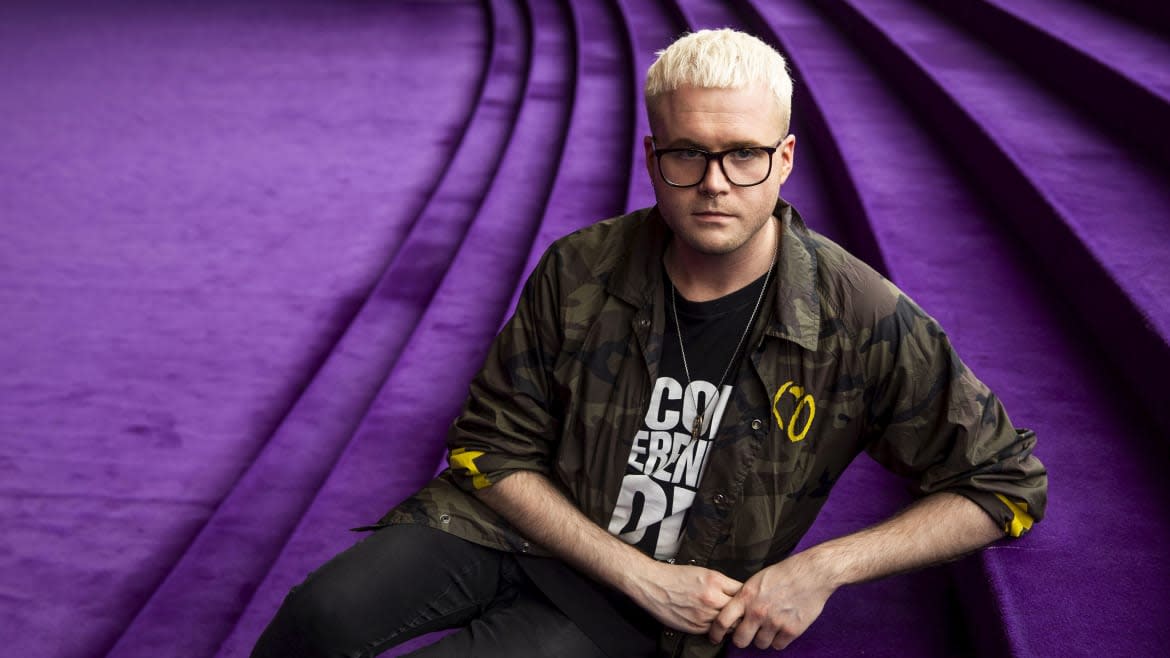Cambridge Analytica Whistleblower: Google Boss’ Daughter Scrubbed From Guardian Exposé

LONDON—Christopher Wylie, the Cambridge Analytica whistleblower, claims that Sophie Schmidt, the daughter of former Google CEO Eric Schmidt, successfully campaigned for The Guardian to scrub her name from one of their bombshell data-abuse stories.
In a memoir that will be published Tuesday, he says that The Guardian’s willingness to back down in the face of Schmidt’s legal threats—and “water down” a story that had already been published—convinced him that he could no longer trust the British newspaper alone to publish his allegations about Cambridge Analytica.
Wylie had helped The Guardian report on Cambridge Analytica anonymously for months, but he said he was shocked when the newspaper amended a May 2017 story. That story originally claimed it was Sophie Schmidt who suggested to Alexander Nix, the former director of Cambridge Analytica’s parent company SCL, that he should get in touch with Peter Thiel’s Palantir and look into using data mining techniques to bolster their political operations.
“Any trust I had in The Guardian was wrecked when the paper failed to stand by its own reporting,” he wrote, according to an excerpt of Mindf*ck: Cambridge Analytica and the Plot to Break America seen by The Daily Beast.
A Guardian news & media spokesperson said, “We are disappointed that this book appears to contain factual inaccuracies about the Guardian which were not put to us prior to publication.
“We have raised a number of concerns with the publishers and are talking to them about how they plan to rectify this.”
The reporter who wrote the story, Carole Cadwalladr, said it was incredibly difficult for British media organizations to stand up to well-resourced legal threats.
“Schmidt bullied a British newspaper using British privacy laws. It's extraordinary that the daughter of Eric Schmidt—the man who says that privacy is dead—would be using U.K. privacy laws to get herself taken out of the piece,” she told The Daily Beast.
“News organizations have difficult choices to make, don’t have an endless pot of money, and have to make hard choices. It's a measure of the difficulty of publishing this work that The Guardian decided they couldn't defend that one.”
Schmidt was an intern at SCL when Wylie writes that she “introduced Alexander to some of the executives at Palantir.” The New York Times later reported on Schmidt’s alleged suggestion. Palantir, a secretive tech company, was co-founded by Thiel, a Silicon Valley billionaire and major Trump donor, who also sits on the board of Facebook.
“The idea that Cambridge Analytica had dealings with Palantir suggested by the daughter of Eric Schmidt the chairman of Google just seemed like a really massive deal because the whole piece was about the power of these Silicon Valley tech companies,” Cadwalladr said.

Wylie wrote that he was not one of the sources who had spoken to Cadwalladr about Schmidt, but he said he did know of Schmidt’s role in the history of the company.
“The story wasn’t remotely libelous. Schmidt threw a battalion of lawyers at The Guardian, with the threat of a time-consuming and expansive legal battle. Instead of fighting an obviously spurious lawsuit, the paper agreed to remove Schmidt’s name several weeks after publication,” he said. Cadwalladr emphasized that it was privacy concerns rather than libel that were raised.
“Then Cambridge Analytica threatened to sue over the same article,” Wylie writes. “And even though The Guardian had documents, emails, and files that confirmed everything I had told them, they backed down again. Editors agreed to flag certain paragraphs as ‘disputed,’ to appease Cambridge Analytica and mitigate the paper’s liability. They took Cadwalladr’s well-sourced story and watered it down. At this point, my heart sank. I thought, All right, I’ve just moved back to London, I haven’t got a job, and I’m being asked to put my neck on the line for a newspaper that won’t even defend its own journalism.”
Wylie had been in discussions about going public with his full story but now began to re-think.
He said he was put in touch with Gavin Millar, a well-known London lawyer who had worked on the Edward Snowden case. Wylie said the lawyer suggested he give the story to a U.S. newspaper because the First Amendment provided a stronger defense against accusations of libel and “The New York Times was far less likely to back down than The Guardian had been, and it would never delete parts of articles after the fact.”
Wylie said he then gave The Guardian an ultimatum. “I reiterated to the paper’s editors that I would not be cooperating or handing over documents until there was an agreement with The New York Times.”
Cadwalladr said: “He's right to say that it did dent his confidence in publishing in Britain but it was actually The Guardian's Katharine Viner who reached out to Dean Baquet at the New York Times to help set up the partnership.”
Wylie’s revelations were published jointly by The Guardian and The New York Times. It eventually emerged that more than 87 million Facebook profiles had been compromised as part of a vast data collection operation. Cambridge Analytica, which worked for the Trump campaign in 2016, was bankrupted and Facebook was fined a record $5 billion by the Federal Trade Commission.
Got a tip? Send it to The Daily Beast here
Get our top stories in your inbox every day. Sign up now!
Daily Beast Membership: Beast Inside goes deeper on the stories that matter to you. Learn more.

